广州新版英语六级下册每单元知识点总结
6下英语知识点总结
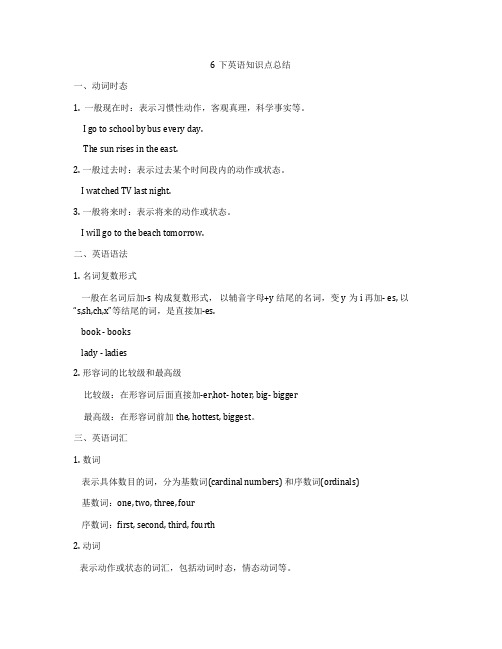
6下英语知识点总结一、动词时态1. 一般现在时:表示习惯性动作,客观真理,科学事实等。
I go to school by bus every day.The sun rises in the east.2. 一般过去时:表示过去某个时间段内的动作或状态。
I watched TV last night.3. 一般将来时:表示将来的动作或状态。
I will go to the beach tomorrow.二、英语语法1. 名词复数形式一般在名词后加-s构成复数形式,以辅音字母+y 结尾的名词,变y为i 再加- es, 以“s,sh,ch,x”等结尾的词,是直接加-es.book - bookslady - ladies2. 形容词的比较级和最高级比较级:在形容词后面直接加-er,hot- hoter, big- bigger最高级:在形容词前加the, hottest, biggest。
三、英语词汇1. 数词表示具体数目的词,分为基数词(cardinal numbers) 和序数词(ordinals)基数词:one, two, three, four序数词:first, second, third, fourth2. 动词表示动作或状态的词汇,包括动词时态,情态动词等。
be(am, is, are) do, have四、英语听力1. 日常生活对话包括问路,购物,定餐,订票等日常生活和旅行中会用到的对话。
2. 听力材料包括录制的英语新闻,广播,对话等。
3. 听力练习可以通过听力练习题目进行练习,提高听力水平。
五、英语阅读1. 阅读材料包括课文,新闻报道,广告,故事等。
2. 阅读技巧阅读时要注意理解文章的主题,掌握文章的中心思想,提高阅读水平。
六、英语写作1. 书面表达书面表达包括日记,便条,信件,作文等,要求词汇运用及语法正确。
2. 写作技巧写作时要注意用词和句式的多样化,提高写作水平。
总结:英语是一门重要的国际语言,在学习过程中要注重对基础知识的掌握,包括语法、词汇、听力、阅读和写作等方面的综合能力。
(完整版)广州新版英语六年级下册每单元知识点总结.docx
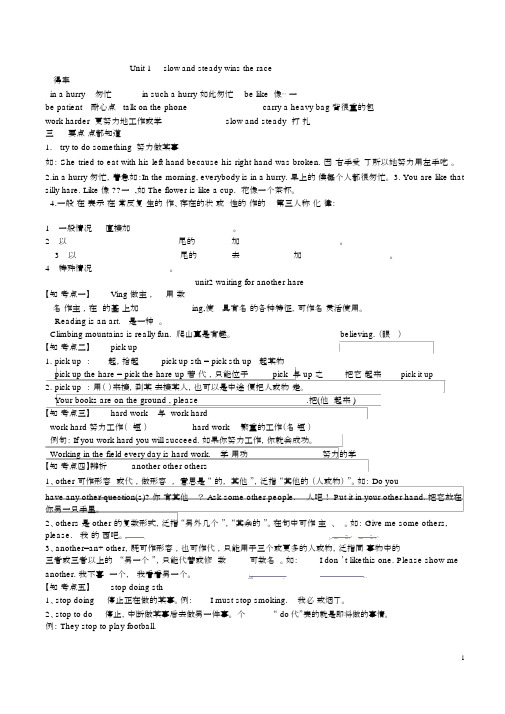
Unit 1slow and steady wins the race得牢in a hurry匆忙in such a hurry 如此匆忙be like 像⋯一be patient耐心点talk on the phone carry a heavy bag 背很重的包work harder 更努力地工作或学slow and steady 打扎三要点点都知道1. try to do something 努力做某事如: She tried to eat with his left hand because his right hand was broken. 因右手受了所以她努力用左手吃。
2.in a hurry 匆忙,着急如:In the morning, everybody is in a hurry. 早上的候每个人都很匆忙。
3. You are like that silly hare. Like 像 ??一 ,如 The flower is like a cup. 花像一个茶杯。
4.一般在表示在常反复生的作、存在的状或性的作的第三人称化律:1 一般情况直接加_____________________。
2 以 _____________________尾的加_____________________。
3 以 _____________________尾的去___________加___________________。
4 特殊情况 ________________。
unit2 waiting for another hare【知考点一】Ving 做主,用数名作主,在的基上加ing,使具有名的各种特征,可作名灵活使用。
Reading is an art. 是一种。
Climbing mountains is really fun. 爬山真是有趣。
_________ __________ believing. (眼)【知考点二】pick up1. pick up :起,拾起pick up sth = pick sth up 起某物pick up the hare = pick the hare up 若代,只能位于pick 与 up 之把它起来pick it up2.pick up :用()来接,到某去接某人,也可以是中途便把人或物走。
广州版小学英语六年级下每单元知识点

Module 1 ChangesUnit 1 Xiaoling’s New Apartment一、单词★show 出示★change 改变★dark 黑暗的★far away from 远离★close to 靠近★grandma 奶奶,外婆★try 试pillow 枕头comfortable 舒适的kung fu 功夫,武术二、短语1. a lot closer to 离···近得多2. between...and... ···和···之间3. close to 靠近4. far away from 远离5. let me try 让我试试6. much bigger 大得多7. show sb. to sth. 给某人看某物8. show sth. to sb. 把某物给某人看9. welcome to 欢迎到来三、句型1. Let me show you the changes between my oldbedroom and the new one.让我给你们看看我旧卧室和新卧室之间的变化。
OK./ All right. 好吧!2. You are nearer to the school now, aren’t you? 你现在离学校比较近,是吗?3. Your old house isn’t bigger than the new one, isit? 你的旧房子不比新房子大,不是吗?4. The bed and the pillows are presents from mygrandma and grandpa for my new bedroom.这张床和枕头是我爷爷奶奶送给我住新卧室的礼物。
5. Here I come. 我来了!6. My bedroom was nice and clean before, butnow it’s messy.之前我的卧室又漂亮又干净,可现在乱七八糟的。
六年级英语下册各单元知识点总结梳理
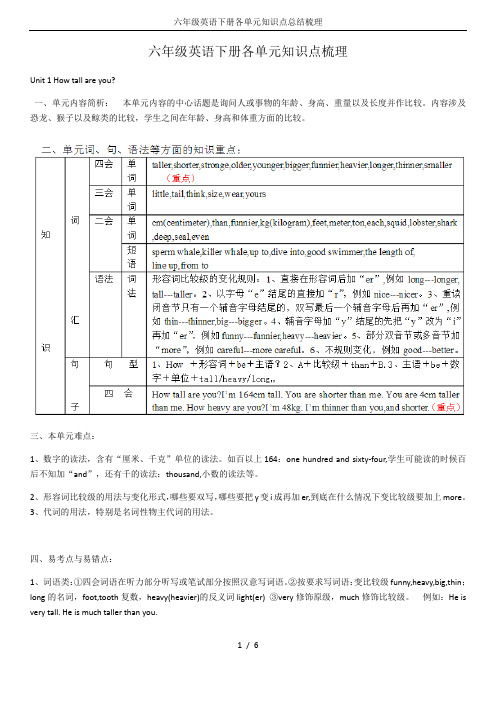
六年级英语下册各单元知识点梳理Unit 1 How tall are you?一、单元内容简析:本单元内容的中心话题是询问人或事物的年龄、身高、重量以及长度并作比较。
内容涉及恐龙、猴子以及鲸类的比较,学生之间在年龄、身高和体重方面的比较。
三、本单元难点:1、数字的读法,含有“厘米、千克”单位的读法。
如百以上164:one hundred and sixty-four,学生可能读的时候百后不知加“and”,还有千的读法:thousand,小数的读法等。
2、形容词比较级的用法与变化形式,哪些要双写,哪些要把y变i成再加er,到底在什么情况下变比较级要加上more。
3、代词的用法,特别是名词性物主代词的用法。
四、易考点与易错点:1、词语类:①四会词语在听力部分听写或笔试部分按照汉意写词语。
②按要求写词语:变比较级funny,heavy,big,thin;long的名词,foot,tooth复数,heavy(heavier)的反义词light(er) ③very修饰原级,much修饰比较级。
例如:He is very tall. He is much taller than you.2、语法、句型类:①How引导的不同特殊疑问句:How be sb.?(问某人状况),How tall/heavy/old be sb./sth?(询问身高、体重、年龄)How long/big/large be---?(问多长、多大)How many/much(问数量、价格)。
②比较级的运用,一定要是相同内容或类别才可以进行比较,这是学生最易出错和混淆娥地方。
例如:Mike’s legs are longer than(John),如果学生翻译会直接填写John,但是一分析就不难发现应该和John的腿作比较的,所以应该是John’s。
再比如My hair is longer than (she).如果不仔细分析大多数学生都会错填成:she,her,但是填hers才是正确的。
六年级下册知识点梳理英语
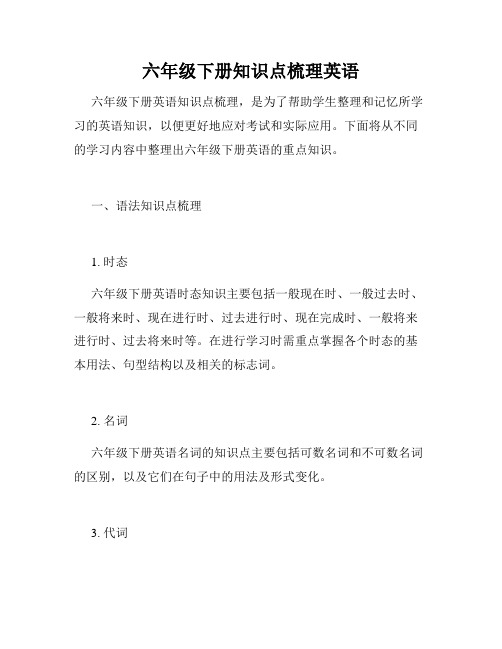
六年级下册知识点梳理英语六年级下册英语知识点梳理,是为了帮助学生整理和记忆所学习的英语知识,以便更好地应对考试和实际应用。
下面将从不同的学习内容中整理出六年级下册英语的重点知识。
一、语法知识点梳理1. 时态六年级下册英语时态知识主要包括一般现在时、一般过去时、一般将来时、现在进行时、过去进行时、现在完成时、一般将来进行时、过去将来时等。
在进行学习时需重点掌握各个时态的基本用法、句型结构以及相关的标志词。
2. 名词六年级下册英语名词的知识点主要包括可数名词和不可数名词的区别,以及它们在句子中的用法及形式变化。
3. 代词六年级下册英语代词的知识点主要包括人称代词、物主代词、反身代词、指示代词、不定代词等。
需要重点掌握它们在句子中的位置、形式变化以及使用时的注意事项。
4. 形容词和副词六年级下册英语形容词和副词的知识点主要包括形容词和副词的比较级和最高级形式,以及形容词和副词在句子中的用法和修饰的对象。
5. 动词六年级下册英语动词的知识点主要包括动词的基本形式、过去式、现在分词、过去分词的规则和不规则形式,以及动词在句子中的用法和时态变化。
二、词汇知识点梳理1. 数字与计量词六年级下册英语数字与计量词的知识点主要包括基数词、序数词、分数和小数的表达方式,以及计量词在句子中的用法。
2. 时间六年级下册英语时间的知识点主要包括表达年月日、星期、季节、时刻等的表达方式和相关的词汇。
3. 颜色六年级下册英语颜色的知识点主要包括基本的颜色词汇以及它们在句子中的用法。
4. 服装和身体部位六年级下册英语服装和身体部位的知识点主要包括各种服装和身体部位的表达方式,以及它们在句子中的使用。
5. 食物六年级下册英语食物的知识点主要包括各种食物的表达方式和词汇,以及饮食习惯和相关的表达方式。
三、阅读技巧知识点梳理1. 阅读技巧六年级下册英语阅读技巧的知识点主要包括阅读理解中的主旨概括、细节理解、推理判断等技巧,以及根据上下文猜测词义和根据插图理解文章的能力。
(完整版)六年级下册英语知识点总结

(完整版)六年级下册英语知识点总结六年级下册英语知识点总结第一单元(Unit1 How tall are you?)单词:tall—taller更高的short—shorter 更矮的strong—strong更强壮的old—older年龄更大的young—younger 更年轻的big—bigger更大的heavy—heavier 更重的long—longer 更长的thin—thinne更瘦的small—smaller 更小的dinosaur恐龙hall大厅metre,meter 米than比both 两个都kilogram千克,公斤countryside乡村low—lower更低的shadow阴影,影子smart—smarter更聪明的become开始变得,变成句子:1、That's the tallest dinosaur in this hall.那是这个厅里最高的恐龙。
2、You’re older than me. 你比我大。
3、How tall are you ?你有多高?I’m 1.65 metres.我身高1.65米。
4、What size are your shoes ?你穿多大号的鞋?5、My shoes are size 37. 我穿37号的鞋。
6 、Your feet are bigger than mine .你的脚比我的大。
7、How heavy are you ?你有多重?I’m 48 kilograms .我体重48公斤。
8、It’s taller than both of us togethe r .它比我们俩加在一起还高。
应该掌握的知识点:1、形容词变为比较级的变化规则:(1)一般情况下,在形容词的词尾直接加er。
如: tall—taller short—shorter.(2)以字母e结尾的形容词,在词尾直接加r,如:nice—nicer. late—later(3)以重读闭音节结尾,且结尾只有一个辅音字母的词,先双写这个辅音字母,再加er.如:big—bigger thin—thinner fat—fatter(4)以辅音字母加y结尾的双音节形容词,先变y为i , 再加er。
(完整版)六年级英语下册知识点归纳整理

(完整版)六年级英语下册知识点归纳整理
本文档旨在对六年级英语下册知识点进行归纳整理,以便学生复和掌握重要内容。
以下是本学期主要研究的知识点总结:
1. 语法知识
- 动词时态: 一般现在时、一般过去时、一般将来时
- 形容词和副词的比较级和最高级
- 名词单数变复数的规则
- 代词的用法:主格、宾格、形容词性物主代词和名词性物主代词
- 祈使句和反意疑问句的构成
- 直接引语和间接引语的转述
- 英语中常见的连词:and, but, or, so等
2. 阅读理解
- 阅读并理解文章的主旨和细节
- 根据文章内容回答问题
- 根据上下文理解词义
- 分析文章的结构和语言特点
3. 写作技巧
- 书面表达:如写作短文、日记、邮件等
- 口头表达:能够用适当的语言表达观点和意见- 写作材料的组织和结构
- 注意语法和拼写错误
4. 口语交际
- 日常交流用语:问候、介绍、道歉、邀请等- 能够用正确的语音语调进行交流
- 合作和团队合作交流的技巧
5. 听力技巧
- 能够听懂简单对话和问题
- 能够根据听到的内容回答问题和做出反应
- 提高听力技巧的方法和练
以上是六年级英语下册的主要知识点归纳整理,请同学们认真复习和巩固,以提高英语能力。
希望本文档能对学生们的学习有所帮助。
六年级下册英语书每个模块简单概括

六年级下册Unit 1 How tall are you?一.必背单词(形容词的比较级)一般形容词→词尾+ertall ------ taller 高的----更高的short ------ shorter 矮的/短的----更矮的/更短的long ------ longer 长的----更长的strong------ stronger 强壮的----更强壮的old ------ older 老的/旧的----更老的/更旧的young------ younger 年轻的----更年轻的small------ small 小的----更小的low------ lower 低地----更低地smart------smarter 聪明的----更聪明的以e结尾的形容词→词尾+rlarge ------ larger 大的----更大的late ------ later 晚的----更晚的simple ------ simpler 简单的----更简单的safe ------ safer 舒服的----更舒服的以重读闭音节结尾,辅+元+辅→双写最后一个辅音字母+erbig-----bigger 大的-----更大的thin-----thinner 瘦的-----更瘦的fat-----fatter 胖的------更胖的sad -----sadder难过的-----更难过的hot-----hotter 热的-----更热的wet-----wetter 潮湿的-----更潮湿的辅音字母+y 结尾→改y 为i +erhappy-----happier 开心的-----更开心的heavy-----heavier 重的------更重的funny-----funnier 滑稽的------更滑稽的angry------angrier 生气的----更生气的sunny------sunnier 生气的----更生气的windy------windier 有风的----更有风的busy------busier 忙的----更忙的early------earlier 提早的----更早的dinosaur 恐龙hall 大厅than 比both 两个都meter 米kilogram 千克;公斤size 号码feet 脚wear 穿countryside 乡村shadow 影子;阴影become 变成;开始变得二.重点短语Talk about 谈论longer and longer 越来越长Go hiking 去徒步旅行ask/answer a question 问/回答问题on the weekend 在周末every day 每天Have a look 看一看too much 太多(后接不可数名词)Go on a trip 去旅行both of us 我们俩Lower and lower 越来越低三.重点句型⑴问年龄,身高,体重等How old are you? How tall are you? How heavy are you?--- I’m _______ (years old). --- I’m ______metres tall. ---- I’m ______ kilograms .⑵问物品的情况:①How large is your room? 你的房间有多大?It’s __________ m (square meters.) 有_______ 平方米。
六年级下册各单元知识要点

单元语法知识要点
目录
Unit1 Unit2 Unit3 Unit4
Unit5 Unit6 Unit7 Unit8
Unit1 The lion and the mouse
1、large 大的 近义词是big 反义词是small小的 2、wake...up 吵醒,叫醒 表示“吵醒某人,叫醒某人”时,代词要放在中 间,为wake sb. up;如果是人名,既可以放中间,也可以放后面说成wake
Thanks
Unit6 An intersting country一个有趣的国家
1、send me some photos 寄给我一些明信片;send 寄送 ;给某人寄某物可以用send sth. to sb.或send sb. sth. 2、find out 发现 3、a beautiful city 一个漂亮的城市 4、just wait and see等着看 5、next week下周 6、sport lover运动爱好者 7、Big Ben大本钟 8、Tower bridge塔桥 9、London Eyes伦敦眼 10、exciting与excited都是形容词,都是从excite变化而来 的。excited意为“激动的,兴奋的”,一般修饰人,人作 主语时常用excited;而exciting意为“令人兴奋的”,一般 修饰物,物作主语时常用exciting。 11、What do you think?few,a little用法
• a lot of可修饰可数名词和不可数名词,意为“许多,大 量”,等于many,much,lots of等。 • some 也可以与可数名词复数和不可数名词连用,意为“ 一些”,表示数量不是很多。 • a few 修饰可数名词复数,意为“几个”,表示数量较少 • a little 做形容词时,修饰不可数名词,表示肯定意义,意 为“一点”;如果只用little修饰不可数名词,则表示否定 意义,意为“几乎没有”。
英语六年级下册总结知识点
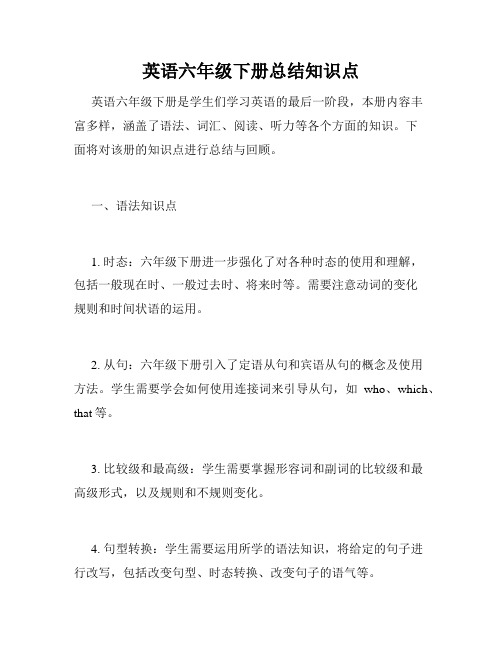
英语六年级下册总结知识点英语六年级下册是学生们学习英语的最后一阶段,本册内容丰富多样,涵盖了语法、词汇、阅读、听力等各个方面的知识。
下面将对该册的知识点进行总结与回顾。
一、语法知识点1. 时态:六年级下册进一步强化了对各种时态的使用和理解,包括一般现在时、一般过去时、将来时等。
需要注意动词的变化规则和时间状语的运用。
2. 从句:六年级下册引入了定语从句和宾语从句的概念及使用方法。
学生需要学会如何使用连接词来引导从句,如who、which、that等。
3. 比较级和最高级:学生需要掌握形容词和副词的比较级和最高级形式,以及规则和不规则变化。
4. 句型转换:学生需要运用所学的语法知识,将给定的句子进行改写,包括改变句型、时态转换、改变句子的语气等。
二、词汇知识点1. 单词拼写:六年级下册重点掌握了一些常用单词的拼写,学生需要通过词汇练习来熟练掌握正确的拼写形式。
2. 词义辨析:学生需要通过学习语境和词义的差异,区分诸如homework和housework、write和right等相近词汇的用法。
3. 词组搭配:学生需要学会一些常用的词组和固定搭配,如catch a cold、take care of等,以便在日常交流中更加流利地表达自己的意思。
三、阅读理解1. 阅读文章:六年级下册的阅读理解题目会提供一些篇幅适中的阅读材料,学生需要仔细阅读并理解文章内容,然后根据问题选择正确的答案或填写相关信息。
2. 推理判断:在阅读理解中,学生需要根据提供的信息进行推理判断,如根据文章内容猜测下一步的情节发展或者推测人物的动机等。
3. 理解意图:六年级下册的阅读理解会提供一些描述人物情感和意图的问题,学生需要通过阅读文章细节,理解并选择适当的答案。
四、听力技能1. 听对话回答问题:六年级下册的听力部分,学生需要仔细听一段对话并根据问题选择正确的答案,这不仅考验学生的听力技巧,也考察其对听到的内容的理解能力。
2. 听短文填空:学生需要听一段短文,根据听到的内容填写相关信息,这要求学生在听的同时能够做到快速理解和准确记录。
(完整版)广州版小学英语6年级下册unit1知识点总结(可编辑修改word版)

Unit 1 slow and steady wins the race 一、填写单词。
1.稳健的3.尝试5.如此匆忙7.意思是9.不小心的11.记住13.努力地二、词组记得牢2.赢4.携带扛6.8.骄傲的10.耐心的12. 悲伤的14.更努力in a hurry 匆忙in such a hurry 如此匆忙be like 像…….一样be patient 耐心点talk on the phone 讲电话carry a heavy bag 背很重的包work harder 更努力地工作或学习slow and steady 稳打稳扎三、要点难点都知道1.try to do something 努力做某事如:She tried to eat with his left hand because his right hand was broken.因为右手受伤了所以她努力用左手吃饭。
2.in a hurry 匆忙,着急如:In the morning, everybody is in a hurry. 早上的时候每个人都很匆忙。
3.You are like that silly hare. Like 像…….一样,如:The flower is like a cup.这花像一个茶杯。
4.一般现在时表示现在经常反复发生的动作、存在的状态或习惯性的动作的时态,如果主语是第三人称单数,动词则有相应的改变。
四、动词第三人称变化规律1一般情况直接加。
2以结尾的单词加。
3以结尾的单词去加。
4特殊情况。
模块练习一、写出下列单词的第三人称单数形式。
ask——meet——teach——sit——kick——look——listen——eat——put——knock——open——give——see——pull——show——wash——try——take——wake——shut——count——share——post——play——hide——seek——hold——stand——do——jump——stop——touch——二、写出下列动词的原形。
(完整版)广州新版英语六年级下册每单元知识点总结
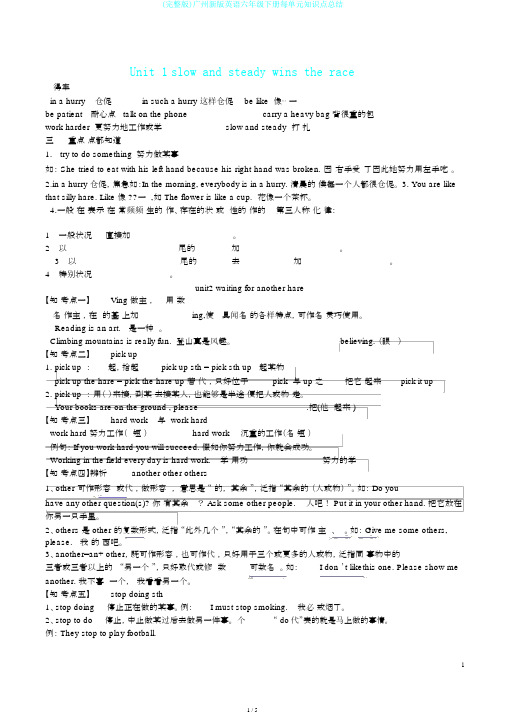
Unit 1 slow and steady wins the race得牢in a hurry仓促in such a hurry 这样仓促be like 像⋯一be patient耐心点talk on the phone carry a heavy bag 背很重的包work harder 更努力地工作或学slow and steady 打扎三重点点都知道1. try to do something 努力做某事如: She tried to eat with his left hand because his right hand was broken. 因右手受了因此她努力用左手吃。
2.in a hurry 仓促,焦急如:In the morning, everybody is in a hurry. 清晨的候每一个人都很仓促。
3. You are like that silly hare. Like 像 ??一 ,如 The flower is like a cup. 花像一个茶杯。
4.一般在表示在常频频生的作、存在的状或性的作的第三人称化律:1 一般状况直接加_____________________。
2 以 _____________________尾的加_____________________。
3 以 _____________________尾的去___________加___________________。
4 特别状况 ________________。
unit2 waiting for another hare【知考点一】Ving 做主,用数名作主,在的基上加ing,使具闻名的各样特点,可作名灵巧使用。
Reading is an art. 是一种。
Climbing mountains is really fun. 登山真是风趣。
_________ __________ believing. (眼)【知考点二】pick up1. pick up :起,拾起pick up sth = pick sth up 起某物pick up the hare = pick the hare up 若代,只好位于pick 与 up 之把它起来pick it up2.pick up :用()来接,到某去接某人,也能够是半途便把人或物走。
六年级下册英语书笔记
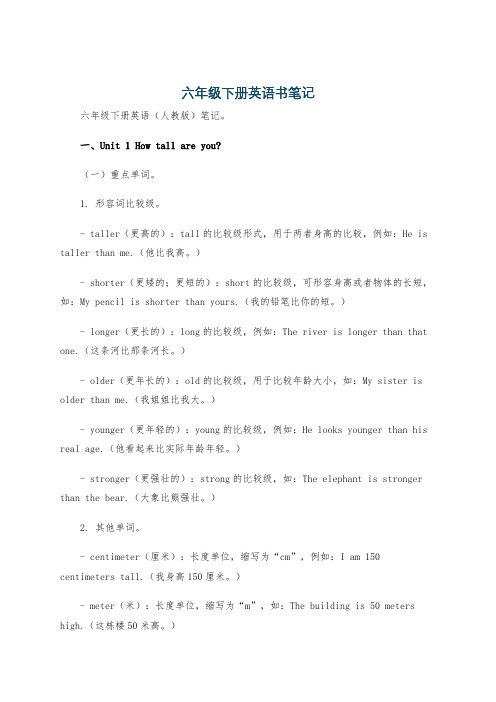
六年级下册英语书笔记六年级下册英语(人教版)笔记。
一、Unit 1 How tall are you?(一)重点单词。
1. 形容词比较级。
- taller(更高的):tall的比较级形式,用于两者身高的比较,例如:He is taller than me.(他比我高。
)- shorter(更矮的;更短的):short的比较级,可形容身高或者物体的长短,如:My pencil is shorter than yours.(我的铅笔比你的短。
)- longer(更长的):long的比较级,例如:The river is longer than that one.(这条河比那条河长。
)- older(更年长的):old的比较级,用于比较年龄大小,如:My sister is older than me.(我姐姐比我大。
)- younger(更年轻的):young的比较级,例如:He looks younger than his real age.(他看起来比实际年龄年轻。
)- stronger(更强壮的):strong的比较级,如:The elephant is stronger than the bear.(大象比熊强壮。
)2. 其他单词。
- centimeter(厘米):长度单位,缩写为“cm”,例如:I am 150 centimeters tall.(我身高150厘米。
)- meter(米):长度单位,缩写为“m”,如:The building is 50 meters high.(这栋楼50米高。
)- kilogram(千克;公斤):重量单位,缩写为“kg”,例如:This bag weighs 5 kilograms.(这个包重5公斤。
)(二)重点句型。
1. 询问身高、长度等。
- How tall are you?(你有多高?)- I'm 1.65 meters.(我身高1.65米。
六年级下英文知识点总结归纳

六年级下英文知识点总结归纳六年级下学期的英语学习内容丰富多样,包括语法、词汇、阅读理解等方面的知识点。
在这篇文章中,我将对六年级下英文知识点进行总结归纳,帮助大家复习和回顾所学知识。
一. 语法知识点1. 时态:a. 一般现在时:表示经常性动作或事实。
b. 一般过去时:表示过去发生的动作或状态。
c. 现在进行时:表示正在进行的动作。
d. 现在完成时:表示过去发生的与现在有关的动作或状态。
e. 将来时:表示将来要发生的动作或状态。
2. 句型结构:a. 肯定句:主语 + 动词 + 其他。
b. 否定句:主语 + 动词 + not + 其他。
c. 疑问句:助动词/系动词/情态动词 + 主语 + 动词 + 其他。
d. 条件句:If + 简单句(一般将来时/现在完成时) + 简单句(将来时/一般现在时)。
3. 引导词:a. 副词:以-ly结尾,用来修饰动词或形容词。
b. 连词:用于连接两个短语、句子或句子的部分。
c. 关系代词:引导定语从句,如who, which, that。
d. 疑问代词:用来提问,如who, what, when, where, why, how。
二. 词汇知识点1. 动词短语:a. 表示喜欢、擅长等情感状态的动词短语:enjoy, love, like, be good at。
b. 表示持续动作的动词短语:keep doing sth, go on doing sth。
c. 表示计划、决定等意图的动词短语:want to, would like to, plan to, decide to。
2. 名词短语:a. 表示风景、气候等自然事物的名词短语:sunny day, beautiful scenery, fresh air。
b. 表示运动、游戏等娱乐活动的名词短语:play football, go swimming, have fun。
3. 形容词短语:a. 表示颜色、形状等外貌特征的形容词短语:red flowers, round table。
广州英语六年级下册每单元知识点总结
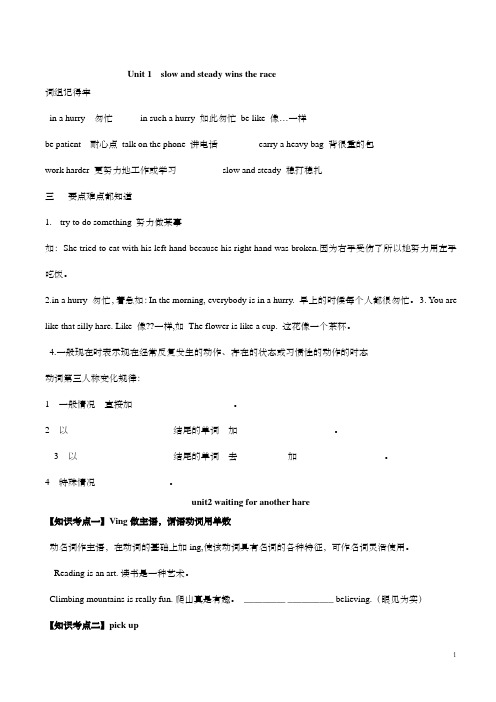
Unit 1 slow and steady wins the race词组记得牢in a hurry 匆忙in such a hurry 如此匆忙be like 像…一样be patient 耐心点talk on the phone 讲电话carry a heavy bag 背很重的包work harder 更努力地工作或学习slow and steady 稳打稳扎三要点难点都知道1.try to do something 努力做某事如:She tried to eat with his left hand because his right hand was broken.因为右手受伤了所以她努力用左手吃饭。
2.in a hurry 匆忙,着急如:In the morning, everybody is in a hurry. 早上的时候每个人都很匆忙。
3. You are like that silly hare. Like 像??一样,如The flower is like a cup. 这花像一个茶杯。
4.一般现在时表示现在经常反复发生的动作、存在的状态或习惯性的动作的时态动词第三人称变化规律:1一般情况直接加_____________________ 。
2以_____________________ 结尾的单词加_____________________。
3以_____________________结尾的单词去___________加___________________。
4特殊情况________________。
unit2 waiting for another hare【知识考点一】Ving做主语,谓语动词用单数动名词作主语,在动词的基础上加ing,使该动词具有名词的各种特征,可作名词灵活使用。
Reading is an art. 读书是一种艺术。
Climbing mountains is really fun. 爬山真是有趣。
新编部编版英语六下知识点整理
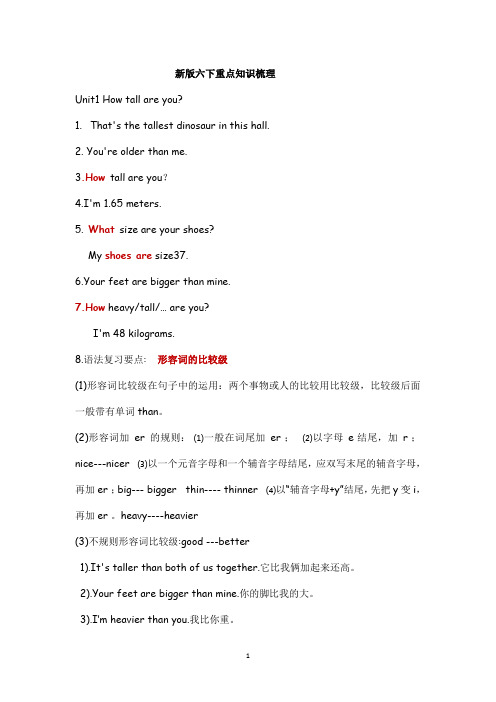
新版六下重点知识梳理Unit1 How tall are you?1.That's the tallest dinosaur in this hall.2. You're older than me.3.How tall are you?4.I'm 1.65 meters.5. What size are your shoes?My shoes are size37.6.Your feet are bigger than mine.7.How heavy/tall/… are you?I'm 48 kilograms.8.语法复习要点: 形容词的比较级(1)形容词比较级在句子中的运用:两个事物或人的比较用比较级,比较级后面一般带有单词than。
(2)形容词加er的规则:⑴一般在词尾加er ;⑵以字母e 结尾,加r ;nice---nicer ⑶以一个元音字母和一个辅音字母结尾,应双写末尾的辅音字母,再加er ;big--- bigger thin---- thinner ⑷以“辅音字母+y”结尾,先把y变i,再加er 。
heavy----heavier(3)不规则形容词比较级:good ---better1).It's taller than both of us together.它比我俩加起来还高。
2).Your feet are bigger than mine.你的脚比我的大。
3).I’m heavier than you.我比你重。
Unit 2 Last weekend动词过去式:clean – cleaned stay -- stayed wash—— washed watch ——watched have——had sleep ——slept read ——read go——went see ——saw last 上一个 yesterday 昨天 before在…之前clean my room wash my clothes stay at home watch TV go boating read a book see a film have a cold sleep climb a mountain cook dinner1. How was your weekend? 你周末过得怎么样?2. It was good/fine/ok, thank you. 很好,谢谢!3. What did you do last weekend? 你上个周末干了什么?4.I stayed at home with your grandma.我和你奶奶呆在家里.5. Did you do anything else? 你还做了其他什么事吗?6. Yes, I cleaned my room and washed my clothes.是的,我扫了房间,还洗了衣服。
六年级英文下册知识点
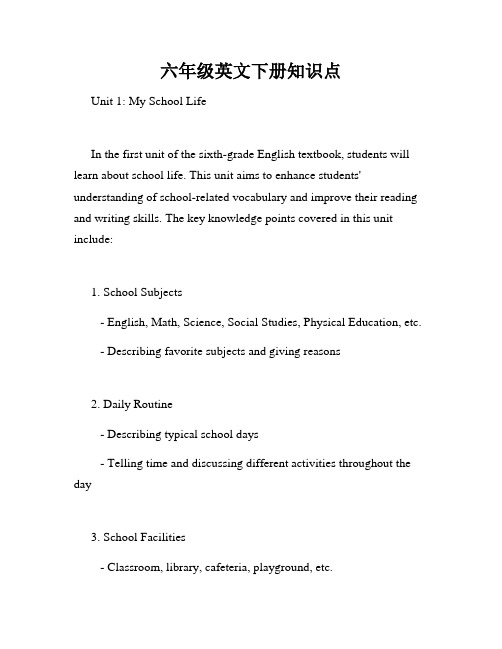
六年级英文下册知识点Unit 1: My School LifeIn the first unit of the sixth-grade English textbook, students will learn about school life. This unit aims to enhance students' understanding of school-related vocabulary and improve their reading and writing skills. The key knowledge points covered in this unit include:1. School Subjects- English, Math, Science, Social Studies, Physical Education, etc.- Describing favorite subjects and giving reasons2. Daily Routine- Describing typical school days- Telling time and discussing different activities throughout the day3. School Facilities- Classroom, library, cafeteria, playground, etc.- Describing the features and functions of each facility4. School Rules and Regulations- School uniforms, behavior expectations, attendance, etc.- Discussing rules and regulations and expressing opinions on themUnit 2: My FamilyUnit 2 focuses on the topic of family. Through various reading passages and activities, students will learn to describe their family members, talk about family traditions, and write about their own family life. The main knowledge points covered in this unit include:1. Family Members- Mother, father, sister, brother, grandparents, etc.- Describing family members' appearances, personalities, and occupations2. Daily Activities- Talking about daily routines and household chores- Using present tense verbs to describe activities3. Family Traditions and Special Occasions- Celebrations, festivals, and family customs- Describing traditions and explaining the significance behind them4. Family Relationships- Discussing sibling relationships and family bonds- Expressing love and gratitude towards family membersUnit 3: Around TownThe third unit of the sixth-grade English textbook introduces students to various places and activities around town. Through vocabulary building, reading comprehension exercises, and speaking activities, students will develop their language skills related to describing locations and giving directions. The key knowledge points covered in this unit include:1. Places in Town- Bank, hospital, supermarket, post office, etc.- Describing the purpose and services offered by each place2. Giving Directions- Vocabulary related to giving directions (e.g., turn left, go straight)- Using prepositions and imperatives to give accurate directions3. Modes of Transportation- Bus, subway, taxi, bicycle, etc.- Discussing different transportation options and their advantages4. Describing Locations- Using adjectives to describe places in town- Expressing preferences for different locationsUnit 4: Festivals and CelebrationsUnit 4 focuses on the topic of festivals and celebrations. Students will learn about various cultural celebrations around the world and enhance their understanding of cultural diversity. The main knowledge points covered in this unit include:1. Major Festivals- Chinese New Year, Christmas, Diwali, Thanksgiving, etc.- Learning about the origins, traditions, and customs of each festival2. Cultural Diversity- Comparing and contrasting different festivals- Understanding and respecting cultural differences3. Festive Food and Traditions- Traditional dishes and special cuisines during festivals- Describing the significance of food in cultural celebrations4. Festive Activities and Decorations- Fireworks, parades, gift exchanges, and decorations- Discussing various festive activities and their importanceThese are the key knowledge points covered in the sixth-grade English textbook for the second semester. Through comprehensive learning, students will develop their language skills while gaining insights into various aspects of school life, family, communities, and cultural celebrations.。
英语六年级下册知识点汇总
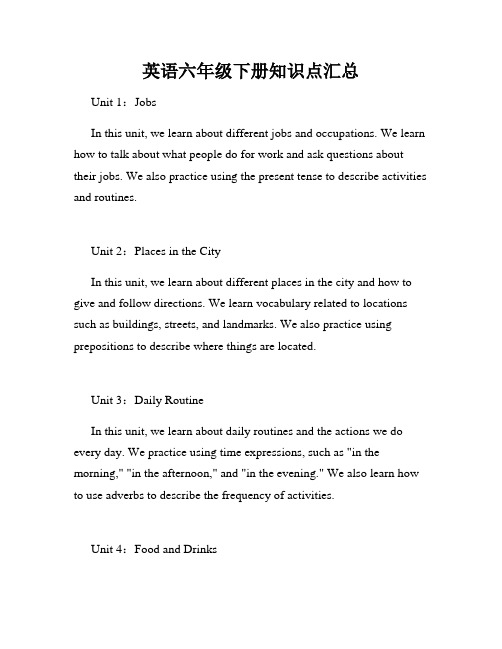
英语六年级下册知识点汇总Unit 1:JobsIn this unit, we learn about different jobs and occupations. We learn how to talk about what people do for work and ask questions about their jobs. We also practice using the present tense to describe activities and routines.Unit 2:Places in the CityIn this unit, we learn about different places in the city and how to give and follow directions. We learn vocabulary related to locations such as buildings, streets, and landmarks. We also practice using prepositions to describe where things are located.Unit 3:Daily RoutineIn this unit, we learn about daily routines and the actions we do every day. We practice using time expressions, such as "in the morning," "in the afternoon," and "in the evening." We also learn how to use adverbs to describe the frequency of activities.Unit 4:Food and DrinksIn this unit, we learn about different types of food and drinks. We learn vocabulary related to fruits, vegetables, snacks, and beverages. We also practice ordering food and drinks in a restaurant using polite expressions and phrases.Unit 5:Hobbies and Leisure ActivitiesIn this unit, we learn about different hobbies and leisure activities. We learn how to talk about our interests and what we like to do in our free time. We also practice using verbs to describe activities such as playing sports, playing musical instruments, and painting.Unit 6:Animals and NatureIn this unit, we learn about different animals and nature. We learn vocabulary related to animals, insects, plants, and natural environments. We also practice using adjectives to describe animals and their characteristics.Unit 7:Weather and SeasonsIn this unit, we learn about different types of weather and the four seasons. We learn vocabulary related to weather conditions, such as sunny, rainy, snowy, and windy. We also practice using the present continuous tense to describe current weather conditions.Unit 8:TransportationIn this unit, we learn about different modes of transportation. We learn vocabulary related to vehicles, such as cars, buses, trains, and airplanes. We also practice using phrases and expressions to talk about how we travel from one place to another.Unit 9:Family and RelationshipsIn this unit, we learn about family members and relationships. We learn vocabulary related to family members, such as parents, siblings, and grandparents. We also practice using possessive adjectives to describe family relationships.Unit 10:Countries and NationalitiesIn this unit, we learn about different countries and nationalities. We learn vocabulary related to countries, nationalities, and languages. We also practice using the verb "to be" to describe nationalities and ask questions about someone's nationality.Unit 11:Daily ActivitiesIn this unit, we review and consolidate the knowledge we have learned throughout the year. We practice using all the grammar and vocabulary we have studied to talk about our daily activities. We also practice asking and answering questions about our routines and interests.Congratulations on completing the English curriculum for the sixth grade! I hope you have enjoyed learning and practicing English throughout the year. Remember to keep practicing and using English in your daily life to improve your language skills further. Good luck!。
- 1、下载文档前请自行甄别文档内容的完整性,平台不提供额外的编辑、内容补充、找答案等附加服务。
- 2、"仅部分预览"的文档,不可在线预览部分如存在完整性等问题,可反馈申请退款(可完整预览的文档不适用该条件!)。
- 3、如文档侵犯您的权益,请联系客服反馈,我们会尽快为您处理(人工客服工作时间:9:00-18:30)。
广州新版英语六级下册每单元知识点总结Jenny was compiled in January 2021U n i t1s l o w a n d s t e a d y w i n s t h e r a c e 词组记得牢in a hurry 匆忙 in such a hurry 如此匆忙 be like 像…一样be patient 耐心点 talk on the phone 讲电话 carry a heavy bag 背很重的包work harder 更努力地工作或学习 slow and steady 稳打稳扎三要点难点都知道1.try to do something 努力做某事如:She tried to eat with his left hand because his right hand was broken.因为右手受伤了所以她努力用左手吃饭。
a hurry 匆忙,着急如:In the morning, everybody is in a hurry. 早上的时候每个人都很匆忙。
3. You are like that silly hare. Like 像一样,如 The flower is like a cup. 这花像一个茶杯。
4.一般现在时表示现在经常反复发生的动作、存在的状态或习惯性的动作的时态动词第三人称变化规律:1一般情况直接加_____________________ 。
2以_____________________ 结尾的单词加_____________________。
3以_____________________结尾的单词去___________加___________________。
4特殊情况________________。
unit2 waiting for another hare【知识考点一】Ving做主语,谓语动词用单数动名词作主语,在动词的基础上加ing,使该动词具有名词的各种特征,可作名词灵活使用。
Readingisanart.读书是一种艺术。
Climbingmountainsisreallyfun.爬山真是有趣。
_________ __________believing.(眼见为实)【知识考点二】pick up1.pick up :捡起,拾起 pick up sth = pick sth up 捡起某物pick up the hare = pick the hare up若为代词,只能位于pick 与up之间把它捡起来 pick it up2.pick up :用(车)来接,到某处去接某人,也可以是中途顺便把人或物带走。
Your books are on the ground , please_______________________.(把他们捡起来)【知识考点三】hard work 与 work hardwork hard努力工作() hard work 繁重的工作(名词短语)例句:If you work hard you will succeed.如果你努力工作,你就会成功。
Working in the field every day is hard work. 学习用功____________ 努力的学习【知识考点四】辨析another other others1、other可作或代词,做形容词时,意思是“别的,其他”,泛指“其他的(人或物)”。
如: Do you have any other question(s) 你还有其他问题吗 Ask some other people. 问问别人吧! Put it in your other hand. 把它放在你另一只手里。
2、others是other的形式,泛指“另外几个”,“其余的”。
在句中可作、。
如:Give me some others, please. 请给我别的东西吧。
3、another=an+ other,既可作形容词,也可作代词,只能用于三个或更多的人或物,泛指同类事物中的三者或三者以上的“另一个”,只能代替或修饰单数。
如: this one. Please show me another. 我不喜欢这一个,请给我看看另一个。
【知识考点五】stop doing sth1、stop doing 停止正在做的某事。
例:I must stop smoking. 我必须戒烟了。
2、stop to do 停止,中断做某事后去做另一件事。
这个“do”代表的就是即将做的事情。
例:They stop to play football.【知识考点六】from then onfrom then on 从那时起 from now on 从现在起【知识考点七】反身代词【知识考点八】注意以下词组中to的用法have nothing to eat 没东西吃 have nothing to say 没话说 have nothing toto 没事可做【知识考点九】One day, a farmer was working in the field.使用的是过去进行时态。
过去进行时用来讲述过去某个时间正在发生的事情。
将现在进行时中的be动词am, is, are变为was,were就构成过去进行时了。
例如:They were watching TV whenyou called.【知识考点十】一般过去时动词过去式变化规则:1.一般在动词末尾加-ed,如:pull-pulled, cook-cooked2.结尾是e加d,如:taste-tasted3.末尾是辅音字母加一个元音字母和一个辅音字母的重读闭音节,应双写末尾的辅音字母,再加-ed,如:stop-stopped4.以“辅音字母+y”结尾的,变y为i,再加-ed,如:study-studied词组记得牢Play a game 玩个游戏 back leg 后腿Look like 看起来像 king of the animals 动物之王要点难点都知道1. 英语语法之肯定句变否定句,肯定句变否定句口诀,给句子分析它,看它结构是哪个主加be后加not 其他一切全照抄,主加动词主重要,don't doesn't 来帮忙,don't doesn't 中间夹doesn't doesn't 最特殊第三人称单数全靠它。
Unit 4 We can save the animals +-词组记得牢Many other 其他许多的 in danger 处于危险中Disappear forever永远消失 cut down forests 砍伐森林Pollute ocean 污染海洋 have no place to live in 没有的地方生活Things made from animals 动物制成品 do something about it 为此做点生么Plant trees 栽种树木 work together共同努力,合作Save the animals 挽救动物要点难点都知道1.肯定句中并列部分最后两个词用and 连接,否定句中用or 连接,如:I have a ra bbit, a cat and two birds. She doesn’t have any toys or pets.2.Many people buy things made from these animals, like medicines, fur coatsand even foods.Like 意思是:“如,诸如” Chinese are good at sports like badminton, table tennis and swimming.3.never 开头的祈使句表示强烈的否定,相当于“千万不要,一定不要”:Module 3 Famous people主要短语:about a famous historical person(有关于一位着名的历史人物)、 be born in/on…the father of modern China, go on, try to+动词的原形,started to+动原,begin to +动原,make a speech, in the forest, take from…, give to …, find –found, hold-held, pay-paid(支付), in the end, become poorer and poorer.职业:writer, painter, inventor, musician, scientist, film star, composer, politician, coach, dancer, singer, architect,主要句型:1. Dr Sun Yatsen was born in Guangdong.(地点前用in)He was born in 1866.(年和月前用in) I was born on August 17th, 1998.(有具体的日期时,用on)2. What do you mean(你指的是什么意思)3. He was against the emperor.4. He tried to change China and free the people.5. In 1976, the Chinese people lost their Premier Zhou Enlai. =Premier Zhou Enlai died in 1976.6. It doesn’t matter.(没关系)7. Can you tell me more about him(注意more的位置)8. When was he born and when did he die------ He was born in 1881 and died in 1936.主要语法:1、I think he loved the people and the people loved him.(宾语从句)He died in 1791 when he was 35years old.(时间状语从句)2、In the 14th century 在14世纪(指从1300年-1399年)3、the +形容词是指某一类的人。
the poor 指穷人。
4、 be 动词+行为动词的过去分词构成了被动语态。
被动语态中的动词时态仍旧要考虑。
The 2008 Olympic Games were held in Beijing.(已经举行了,所以用被动语态的过去时态)The 2010 Asian Games will be held in Guangzhou.(还未举行,用被动语态的将来时)年代的读法●大多数的没有“0”的年代都是看作两个十位的数字来说比如:1981 nineteen eighty-one●但是有零的就不一样了:1)三个零:就是把年代直接读作 ...thousand 如:2000 two thousand2)两个零在中间:要读作:... thousand and ... 如:2008 two thousand and eight3)两个零在结尾:要把前面两个数字读成十位数,后面加上hundred如:1900 nineteen hundred4)一个零在百位,一个零在个位:读作:...thousand and ...ty 如:1090 one thousand and ninety5)只有一个零在个位:仍旧看成两个十位数来读如:1990 nineteen ninety 6)只有一个零在十位:前面两位当作十位数来读,十位的零读作“oh”,个位直接读如:1906 nineteen oh six7)只有一个零在百位:有两种读法:第一种读法:仍旧看成两个十位数来读如:2015 twenty fifteen第二种读法:读作 ... thousand and ... 如:2015 two thousand and fifteen8)公元前 BC 公元ADUnit 8 The magic words词组记得牢in the middle of 在…中间 walk through a park 穿过公园many more 其他更过的 none of them 没有一个cry out 喊出声 at the bottom of 在…的底部A tree with a sign on it 一颗挂着牌子的树 lead to 通向…the best party ever 最好的派对this is why…这就是…的原因full of…满是…三、要点难点都知道1.情态动词:should表示“应该,劝告,建议,命令”否定为shouldn’tI should help her because she is in danger.她现在处于危险中,我应该帮助她。
